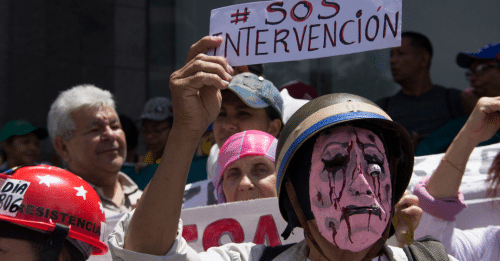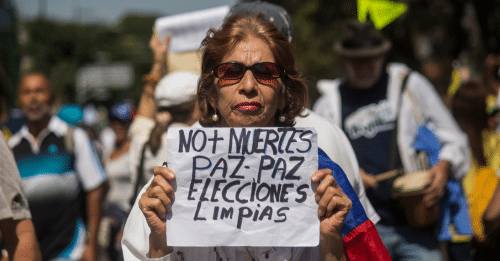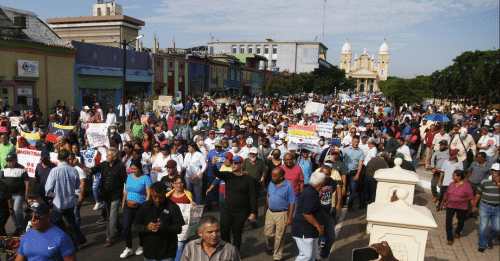For Immigrants, the Journey Doesn’t End at Arrival
For some, the price for a new life is paid over a lifetime.

Moving to the U.S. is fucking hard — at least that’s what I’ve heard.
I’ve definitely considered it: immigrating and starting over in a new place, accessing a different kind of life, and a job that will pay you twice as much as the job you have. Not to mention the security of living elsewhere and the opportunity of escaping your country’s reality, whatever that might be. Obviously, it varies from abject misery, violence, and political instability to meh, could be better.
The Journey
A family friend of mine made the courageous decision to pick up everything and leave.
After he spent several months saving enough money for the trip, he started the trek through unofficial channels. He couldn’t contact his mother very often, which left her worried and anxious about what would happen to him. He reported spending days without eating.
While he was crossing, he was set up and kidnapped. The people he paid for safe passage to the United States, instead, took him to a house. He didn’t know why he was being taken to a house, but he knew it wasn’t normal. He remembers seeing bloody footprints on the floor, feeling scared of what those meant for him, and feeling terrified of what they might do to him.
They held him hostage and demanded a ransom from his mom; money they weren’t able to give. His mother feared the worst for him. She was able to get in touch with the people who organized the trip and demanded they do something about it. Ultimately, they don’t know how they managed to pull it off, but kidnappers freed him without his mom having to pay a cent, but the trauma and the lifelong damage were done.
When I heard the story from his mom, I got chills all over my body. Leaving everything behind and on top of that, suffering so much sounded terrifying. I couldn’t imagine how he actually felt while he was facing possible death and other unknown horrors.
Immigrating: Making the Decision
Many people know the risk they face when crossing into the U.S. illegally. People face that risk out of necessity. They might be running away from gang violence. Some do it because their jobs don’t provide enough to keep them alive, and others are looking for better economic opportunities that can get them and their loved ones out of extreme poverty.
I’ve been scared shitless of living in my country of El Salvador and have been frustrated about the lack of opportunities, even though I know I have the capacity to thrive. I’ve seen my parents stress about money and have contemplated leaving everything here. I’ve met people living in harsh conditions here in El Salvador and somehow still see hope in their eyes for a better life.
But who the fuck would want to pick up and pack up their stuff without knowing what will happen next?
The Arrival
We’ve read all about how the road to the United States is harsh, lonesome, ruthless, and so on and so forth. The trek is hard. If you do it the “right way,” you spend endless hours and money on getting your visa, which most people currently don’t qualify for, and then you spend years saving up for the plane ticket and trip. The alternative is spending several days walking under the burning sun through deserts, jungles, crime-filled cities, and who knows what else in order to avoid migration police, kidnappers, and rapists, all while trying to ration food and water.
If you finally make it to the finish line, whether legally or illegally, you’re then in a new country expecting to see and experience all the possibilities that you’ve heard and dreamed about – better jobs, education, economic stability, and the all-American dream.
But everything is different, the smell, the air, the people, and, of course, the language.
As if surviving the trip wasn’t challenging enough, now that you’re in your new country, you have to change your life. And then the heavy lift begins.
Forced Assimilation
You discover that things were not as you thought they would be. Some people are friendly, some are ruthless, and others are just outright racist.
Then, the white dominant society begins to attempt to strip you of your identity. You’re too loud, your broken English is annoying, you should stop using that piece of clothing or those gold hoops. Parents notice and, out of fear of discrimination, they cut their kids off from their heritage, their language, and their roots.
The kids can barely say gracias, qué tal, and have learned next to nothing about their roots or traditions. Parents do it to protect their children, but as those kids grow older, they begin to feel bitter about what was forced upon them – and what they involuntarily lost.
Not American Enough
Then you see people being told to go back to their country for speaking Spanish.
Finally, it sinks in how important it was for parents to whitewash identity. They wanted the best life for their kids and thought that making them invisible was the best choice.
Sadly, this practice still leads to losing pieces of yourself, which you eventually try to reassemble. Because as many Latinos who look non-white eventually find out, after trying your damndest to assimilate by speaking perfect English, maybe losing your native tongue, dressing “American,” and adopting white beauty standards, many people still see you as a foreigner. You will be a perpetual outsider no matter how many degrees hang on your wall.
After all, you don’t look like them. You’re not part of the club.
Owning Your Identity
That’s when it hits you: no matter how much you change yourself, you will always stand out. So, you make the brave decision to begin owning yourself, being unapologetically you, and embracing your culture. Even though you won’t get those years back, you put all you’ve got into picking everything up again. Maybe you’ll try learning your native language or start wearing clothing with native patterns, or start learning your family’s heritage.
Whatever it is, assimilating to the U.S never comes easy, especially the part about pleasing everyone around except you. Stripping your personality down will hold you back, make you feel confused, and possibly leave you feeling lost. Be proud of who you are, patient in the relearning, but most of all, don’t let anyone else tell you who you are.
Rebuilding yourself will leave you exhausted, and that sense of belonging won’t appear suddenly.
As a native Salvadoran, dropping everything I know, my house, my friends, my job, without being sure of what’s on the other side is too daunting. Even if I’ve experienced feeling out of place in my own country, I can’t quite grasp what it feels like in a foreign country where you have nothing or no one to rely on.
However, things are getting even worse in my reality. You feel like this isn’t living. It’s not fair. Chaos keeps rising and up. The thought of assimilating isn’t even the worst part of moving abroad, but it sure as hell seems much easier when you’re on the side of chaos and misery.
I admire the strength it takes to go through it all, and it feels impossible to leave most days, but I also know that the myth of the American dream is being dismantled, Latinos are claiming their space and their identity, and those who endured so much in pursuit of their dreams might one day feel like the collective effort was worth it.



